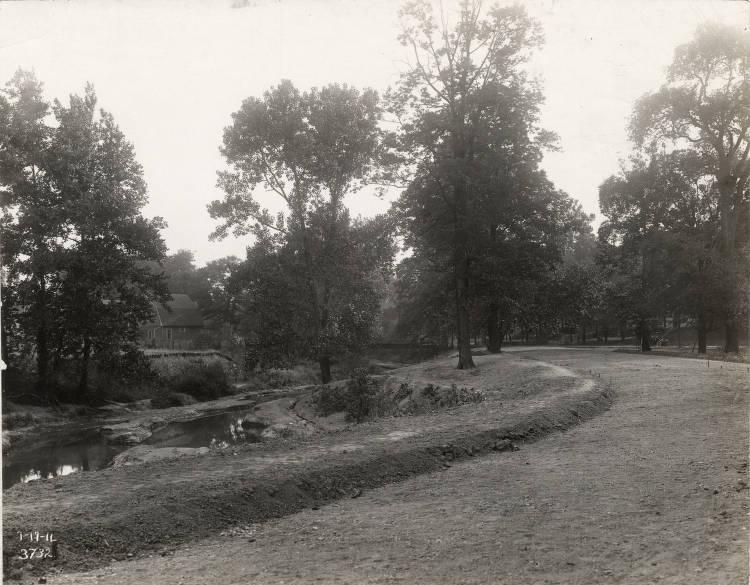The Battle of Pogue’s Run is the derisive name that the gave to events surrounding a stormy session of the state Democratic convention in Indianapolis in May 1863.

The “Battle” described the aftermath of a large state Democratic convention held in Indianapolis on May 20, 1863. On that day, military forces in the city muted Democratic criticism of the Republican administration of President Lincoln and seized hundreds of firearms from Democrats in attendance. While the episode was bloodless, it reflected the extreme tensions existing in Indiana during the .
Indiana Democrats seethed over President Abraham Lincoln’s Emancipation Proclamation, which took effect January 1, 1863, and freed enslaved African American women and men in Confederate-controlled areas of the South. Democrats believed the order was unconstitutional and claimed the war had shifted from coercing the rebel states back into the Union to abolishing slavery.
Democrats railed as well against the Republican Party-controlled Congress’s recent passage of the Enrollment Act, which established a conscription system to fill the ranks of federal armies. Draft enrollments were scheduled to commence in Indiana in the coming days, and many Democrats stated their intention not to submit to the enumeration.
The hostility between the Democrat-controlled Indiana General Assembly and Republican governor had reached an impasse that spring when the legislature adjourned without passing a state budget. Democrats assumed that Morton would have to call a special session, but the governor borrowed funds to keep state government afloat, a legally questionable move. Further, the Union defeat at Chancellorsville, Virginia, earlier in the month called into question the competence of the government, although news was slowly reaching Indiana of Ulysses S. Grant’s victories in several battles near Vicksburg, Mississippi.
Democrats also fumed over military arrests of Democratic speakers in Indiana and the North generally. In May, Maj. Gen. Ambrose E. Burnside, commander of the military Department of the Ohio, had arrested leading anti-war Democrat Clement L. Vallandigham of Ohio and tried him by a military commission for criticism of Lincoln and the army. The commander of the Military District of Indiana, Brig. Gen. Milo S. Hascall, arrested several Indiana Democratic editors and shut down their presses. Indiana Democrats had much to complain about but feared arrest if they aired their complaints.
Military officers in the Old Northwest, however, including Indiana, had received reports from their spies and informants that secret organizations allied to the Democratic Party would use party conventions and similar mass meetings to launch armed uprisings. Immediately before the Indianapolis event, Gen. Hascall traveled to Cincinnati to get orders from his superior officer, Gen. Burnside. On his return, he armed all federal troops encamped locally and paraded them in city streets in a show of force.
Hascall deployed his troops, guns loaded, and bayonets fixed, in conspicuous positions around the city to guard the State House and other government offices, with infantry stationed on the Circle and in Washington Street. He placed artillery on Virginia Avenue at Delaware Street and near the State House, prepared to spray streets with grapeshot. Squadrons of cavalry clattered through the streets. As an added security measure, the city’s Republican mayor issued an order halting the sale of alcoholic beverages during the convention.
On the day of the convention, over 10,000 Democrats converged on the city, most arriving by chartered trains. They heard speeches from prominent political leaders perched on several speaking stands erected around the grounds. Speakers hammered the illegal actions of the Lincoln and Morton administrations, especially the Emancipation Proclamation and arrests of Democratic politicians and editors, and criticized the competence of the army.
The convention passed without violence and significant disorder. During the day, however, soldiers harassed convention-goers in the streets, arresting some for disloyal speech (e.g., cheering for Confederate president Jefferson Davis) and carrying concealed revolvers. As well, city police arrested many attendees on charges of carrying concealed weapons. Prisoners were taken to the Mayor’s Court and fined and released.
That evening, as the convention wound down, Democrats boarded their chartered trains to return home. As one train left the depot, Democrats on board shot off their revolvers and pistols, creating a sustained fusillade. Republican newspapers later reported that bullets struck a nearby military camp and endangered passers-by in the streets, which Democratic papers denied. Troops boarded the cars and searched for firearms, collecting many from passengers. Other passengers tossed their weapons from cars into , a creek that ran near the track. Later, soldiers fished out the guns thrown into the creek. Soldiers reported seeing hundreds of revolvers piled up at headquarters.
No uprising occurred, as army officers had feared. But evidence survives to show that , a local leader of the Knights of the Golden Circle secret organization, was active behind the scenes and used the event to distribute arms to membership. Afterward, Republicans crowed that military action had humiliated the Democrats. The insult joined others inflicted on an aggrieved Indiana Democracy, adding to their sense of oppression and feeding their desire for revenge. The episode represented perhaps the most prominent example of military interference in civil affairs in Indianapolis during the war and displayed the poisonous atmosphere that existed in Indianapolis and the state during the Civil War.
CITE THIS ENTRY
APA:
Towne, S. E. (2024). Battle of Pogue’s Run. Encyclopedia of Indianapolis. Retrieved Feb 20, 2026, from https://indyencyclopedia.org/battle-of-pogue-s-run-may-20-1863/.
MLA:
Towne, Stephen E. “Battle of Pogue’s Run.” Encyclopedia of Indianapolis, 2024, https://indyencyclopedia.org/battle-of-pogue-s-run-may-20-1863/. Accessed 20 Feb 2026.
Chicago:
Towne, Stephen E. “Battle of Pogue’s Run.” Encyclopedia of Indianapolis, 2024. Accessed Feb 20, 2026. https://indyencyclopedia.org/battle-of-pogue-s-run-may-20-1863/.

Help improve this entry
Contribute information, offer corrections, suggest images.
You can also recommend new entries related to this topic.